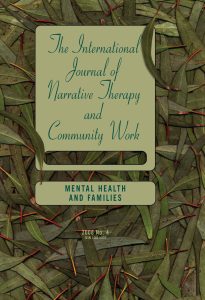 Dear Reader,
Dear Reader,
Welcome to this fourth and final journal issue for 2008. As this issue is sent to the printer we are soon to welcome over 400 participants from different parts of the world to the 9th International Narrative Therapy and Community Work Conference which is to take place here in Adelaide. It has been a momentous year and we are really looking forward to seeing everyone. Some of the papers and presentations that are being shared at the conference will appear in this journal next year.
We’d like to take this opportunity to thank all our readers, friends and colleagues for your kind and thoughtful responses throughout this year. We’d also like to acknowledge the breadth of creativity that is represented in the papers that practitioners are submitting for publication. In the new year we will be announcing a range of new ventures at Dulwich Centre that include greater linking of this journal with our website, the development of a range of web-based training programs, and the launching of a new e-journal.
This journal issue includes a range of papers around the theme ‘mental health and families’. The first paper, ‘Children, parents and mental health’ documents the experiences of those who grew up with parents who were struggling with significant mental health issues. The second paper, by Canadian therapists Ruth Pluznick and Natasha Kis-sines, describes the ways that have taken this project into their own work context and conversations with young people in a children and families mental health service in Toronto. The final paper in this section, by Amanda Worrall who lives and works in central Australia, is on a related theme. It conveys the experiences of a group of parents whose children have been diagnosed with schizophrenia and the skills and knowledges they are using to respond to this situation and to try to bring about changes to the mental health system. These collective projects, based on narrative ideas and focusing on sharing knowledge between family members affected by mental health issues, will continue via our website. We also look forward to publishing papers on the experience of those with mental health struggles who are parenting and caring for children. We would welcome any reflections and/or contributions that readers may have.
The second part of this journal focuses on alternative assessment processes that seek out, not only the effects of problems, but also subordinate stories. Building upon work described earlier in this journal, Lesley Dalyell has developed a narrative assessment checklist which has been trialled within ‘Centrelink’, a major Australian Government Agency.
The third part of this journal describes another collective narrative project based on the experiences, skills and knowledge of women who have experienced grief. As well as including evocative and significant stories, this paper also provides a framework of questions to assist practitioners in their work with women. This project is also continuing, and again we welcome hearing from readers about it.
We would like to acknowledge all those who have contributed to the collective projects described in this journal. All these papers draw on the ideas of Michael White in a range of ways and so this issue of the journal is dedicated to his work.
We wish you well as 2008 comes to an end and we look forward to corresponding in the new year.
Warm regards,
Cheryl White

 Dear Reader,
Dear Reader,